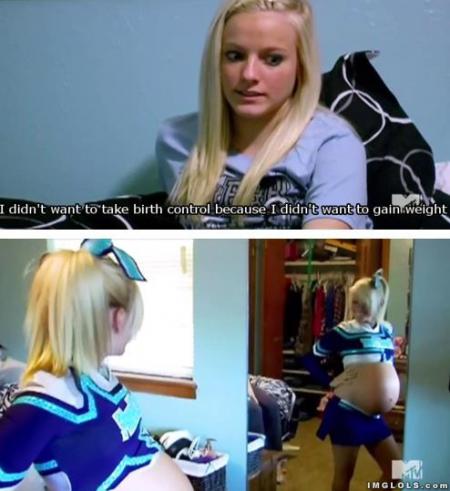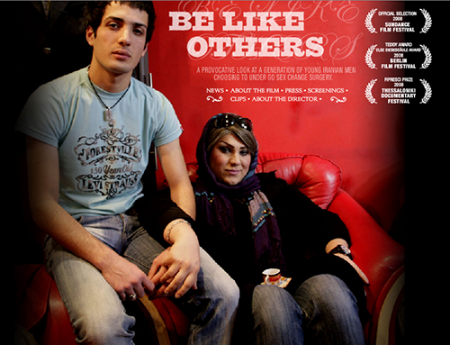Serendip is an independent site partnering with faculty at multiple colleges and universities around the world. Happy exploring!
meowwalex's blog

MTV's Missing Piece
To Begin. . .
As an avid TV junkie, I have stayed up many a night to watch re-runs of the shows “Teen Mom” and “16 & Pregnant.” I know you are probably rolling your eyes if you're not a fan of the “reality” TV phenomenon, but these shows have affected me in a way that other “reality” based shows never could. (...So understandable when thinking about their consistent lack of depth: there are not a multitude of thought-provoking conversations that follow the documentation of rainbow Jello shots and women pulling out other’s hair extensions). These shows have affected me partly because I am the product of unplanned pregnancy to a fifteen-year-old girl myself, and a subsequent adoption. I find the show to be a way to help me begin to understand what I meant to my birth mother at age fifteen, the prime time for being a devoted Frito Lay consumer and wearing exactly what the mannequin wears.


Sarah Palin vs. Mamabear
When our class watched the film Game Change to further our discussion on Sarah Palin, one of the most striking aspects of her portrayal was the public’s focus on her role as a mother, and further, as an “everyday person” who understands the needs of the average family. I quickly remembered that this depiction was incredibly true to reality, as Palin’s role as a mother and wife was continuously touched on, whether in a negative or positive light. When her daughter, Bristol, was announced pregnant during the race, the construct of Palin’s “family first” outlook was questioned by some and applauded by others. A question that arose for me was how Bristol’s pregnancy affected Palin’s already stereotypical gender roles that were being emphasized throughout the campaign.


masculinity and religion
Thinking about the conversation we have started concerning the constructs of masculinity in our culture reminds me a lot of the scandals throughout many religious communities...these are ultimately surprising to the public, not only in their hypocritical qualities, but because they are centered around important men within that community -- previously considered as ideal models for what a good religious man is.
It seems a lot of these incidences are centered around the notion that homosexuality is a behavior that is wrong, and that no strong, religious man could identify as gay. (Why is it that being gay makes you less of a man in the eyes of so many? That is a terribly broad question, I know)
(For example, the Ted Haggard scandal a few years ago, http://articles.cnn.com/2009-01-29/us/lkl.ted.haggard_1_ted-haggard-head-pastor-church-staff-member?_s=PM:US)
...as well as the various incidences throughout the Catholic church.
http://articles.cnn.com/2010-03-19/world/catholic.church.abuse_1_abusive-priests-church-abuse-archdiocese?_s=PM:WORLD
It seems to me that especially in the religious world, the construct of masculinity is something that is especially hurtful.

hello, cruel world
I wanted to learn more about the outreach that Kate Bornstein does today, and her website "Hello Cruel World" is something that I feel is really great.
www.hellocruelworld.net
I think that most people who disregard conversations about gender and sexuality as something that doesn't pertain to them if their lives fit in the expected gender binary don't realize the amount such ignorance can further pain those who are struggling with their identities in such a way. Kate says "I think that the world needs more kind people in it, no matter who or what they are, or do"
I think that in some ways I am also guilty of not trying to learn as much about issues of gender and sexuality, because I have never struggled with my own sexual orientation or felt that I am wrongly gendered. Even so, the gender workbook helped me realize that the "ideal" woman and man are pretend ideas that no one can ever really fulfill no matter how hard that they try. Even if one considers themselves able to fit neatly inside society's accepted gender binary, the binary's ideals pose a problem for everyone. . . regardless of whether you 'appear' to be fitting well within it.

Be Like Others: An Issue Transcending Borders
Of the many riveting cultural situations that we have only begun to explore in class so far, one of the most striking were those of men and women born in the body of a sex that they do not identify with and how society responds to them as transgendered individuals. As I approach the question of feminism and how it differs geographically, I want to take a look into the transsexual community in America and compare it to that in Iran, specifically after having watched the film “Be Like Others”.
In the United States, transgender issues are rising to the forefront – in films such as “Boys Don’t Cry” and “Transamerica” and in news stories about transgendered children and the increase in support for these individuals and their families. Coming across the color photography project My Right Self was an experience that provided me with a more personal and moving account of what it is like to be transgendered and hopes to do the same for the public.
The website is an informative project while the photographs are intended to be a traveling show and part of advocacy to benefit the healthcare community, those who are transgendered and their loved ones. The website’s eager invitation to use photography as a vehicle to initiate conversation shows that part of America, even if a slim one; is becoming more accepting and actually attempting to understand this point of view on some level.


Love is Not a Bowl of Quinces
While "Lifting Bellies" was undoubtedly more a stream of consciousness text than the prose we are given in The Book of Salt, I think that there are places in The Book of Salt that seem like they could be imitating a stream of consciousness form. We are mostly given the story in first person, but at other points, there is a direct switch that Binh makes.
"Quinces are ripe, GertrudeStein, when there are the yellow of canary wings in midflight. They are ripe when their scent teases you with the snap of green apples and the perfumed embrace of coral roses. But even then quinces remain a fruit, hard and obstinate--unless, GertrudeStein, until they are simmered, coddled for hours above a low, steady flame....a color you can taste...love is not a bowl of quinces yellowing in a blue and white china bowl, seen but untouched."
The prose here is so aware of taste and scent and vision, and seems to pave the way for a conversation about how sexuality can be described -- and maybe best so-- when using terms of the five senses (This passage brought to mind Goblin Market in regards to the sense of taste/fruits). I think that it is interesting the way in which Truong has presented the main character -- we get to see what he is really thinking in a way that is a little disjointed sometimes.

"Be Like Others"
After reading Najmabadi's essay concerning sex change operations in Iran, learning that it is considered a way to be able to be attracted to someone in the "right" form (becoming a woman if you are a man who loves a man, or a man if you are a woman who loves a woman), I began to search for more information about this and found that Iran is one of the world's largest centers for sex change operations.
http://www.belikeothers.com/
I also found a film that was shown at Sundance in 2008 which is about this very same topic. I never knew this was such an active conversation and controversial aspects of life in Iran.
There is a chance to watch a few of the clips on the film's website, and one of the men who is about to undergo a sex-change operation is told by his mother that what he is feeling is just a "desire" and nothing more. The mother overall seems to be very worried about her son's operation, wanting him to conform or if not, just act the way that he does within the boundaries of their home. The fact that she calls what he has with his boyfriend and what he feels like inside as simply a "desire" to be something else or to get attention is astounding to me. What makes someone else able to identify that what you feel for someone else is purely desire, or is something that you are choosing to feel, so therefore can stop feeling that way all the same?

Pro-Life Feminist: An Oxymoron?
I thought I understood feminism in its most basic of terms upon deciding to enroll in this course. Now, after having attended the handful of classes held so far, I know that there is no simple way to describe such a word, such a movement. I had imagined my basis of feminist understanding as rather commonplace. Having a mother and aunt who were supporters of Planned Parenthood throughout their early adult lives and onward, I too came to learn about what the organization supported and the importance of standing up for my rights and recognizing that they should be equal to the rights of men.
This past October, Planned Parenthood turned 95 years old. It has spent that time “promoting a commonsense approach to women’s health and well-being, based on respect for each individual’s right to make informed, independent decisions about health, sex, and family planning.” An organization in sharp contrast, Feminists for Life, was established in 1972 and has spent its time "shaping the core feminist values of justice, nondiscrimination, and nonviolence” and does not take a stance on “pre-conception” issues. Maintaining a focus on college campuses, the group pushes against movements like Planned Parenthood that offer abortion, their coin phrase “women deserve better than abortion.”



